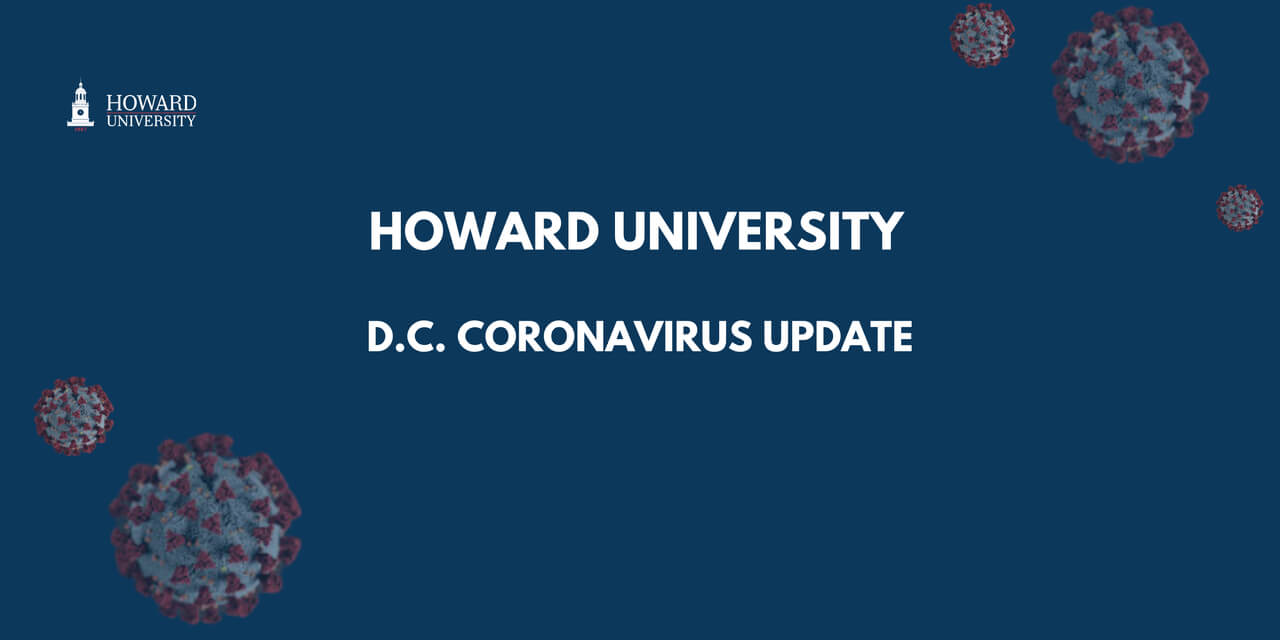
Dear Howard University Community,
On Saturday, D.C. Mayor Muriel Bowser announced the first positive case of Coronavirus Disease (COVID-19) in Washington, D.C. The 50-year old clergyman is hospitalized and listed in stable condition. She also announced the District’s second presumptive case: a visitor who stayed in the District before testing positive for the virus in a Maryland hospital. Virginia has announced its second case, involving a resident of Fairfax City. State officials say both Virginia cases pose low risk of exposure to the general public. The total number of cases in the Washington region has reached nine: 2 in D.C., 2 in Virginia, and 5 in Maryland.
There remains no confirmed cases of Coronavirus Disease 2019 (COVID-19) at Howard University at this time. The University is open and operating under its normal schedule today.
University officials will continue to closely monitor COVID-19 and are actively engaged in daily planning in an effort to inform and reduce the risk to faculty, staff, students and visitors from the virus. All guidelines from the CDC, the U.S. Department of State and the D.C. Department of Health will be followed during this process.
University Travel Restrictions
On Saturday, Howard University announced the suspension of all University-supported, non-essential international travel for students, faculty, and staff. This includes future group trips, spring break programs and individual travel. It also includes mandatory requests for approval of future international travel by the provost and remains in place until further notice.Beyond the actual health risks, we are increasingly concerned about travel restrictions being implemented that may impact the return of individuals engaged in international travel. In addition to potential restrictions that may be under consideration by the federal government, foreign governments are also imposing additional border and travel controls.
Prioritize Your Health and That of The Campus Community
It is important that the campus community be proactive in their health regimens during this time. We each have a responsibility to protect ourselves and each other during this time.The CDC always recommends everyday preventive actions to help prevent the spread of respiratory diseases, including:
- Avoid close contact with people who are sick.
- Avoid touching your eyes, nose, and mouth.
- Stay home when you are sick.
- Cover your cough or sneeze with a tissue, then throw the tissue in the trash.
- Clean and disinfect frequently touched objects and surfaces using a regular household cleaning spray or wipe.
- Wash your hands often with soap and water for at least 20 seconds, especially after going to the bathroom; before eating; and after blowing your nose, coughing, or sneezing.
- If soap and water are not readily available, use an alcohol-based hand sanitizer with at least 60% alcohol. Always wash hands with soap and water if hands are visibly dirty.
Student Health Resources
All registered and insured students have access to our 24-hour telemedicine service www.telehelp4students.com for medical or mental health advice. You may connect via phone, app, or online to speak with a physician or mental health counselor. You can also access the United Healthcare Student Resources (UHCSR) Where for Care website www.uhcsr.com/where4care to receive options on locations that treat specific conditions in this area. If you are not improving or develop difficulty breathing, please call ahead to your provider of choice, including the Student Health Center at 202-806-7540, so that the office can prepare to evaluate you.
This is a rapidly changing situation and appropriate resources are being allocated at the University to continue to monitor, develop and execute plans to maintain the safety and well-being of our community. For more information about the coronavirus, please refer to the CDC website.
Excellence in Truth and Service,
Department of Public Safety and
Student Health Center




